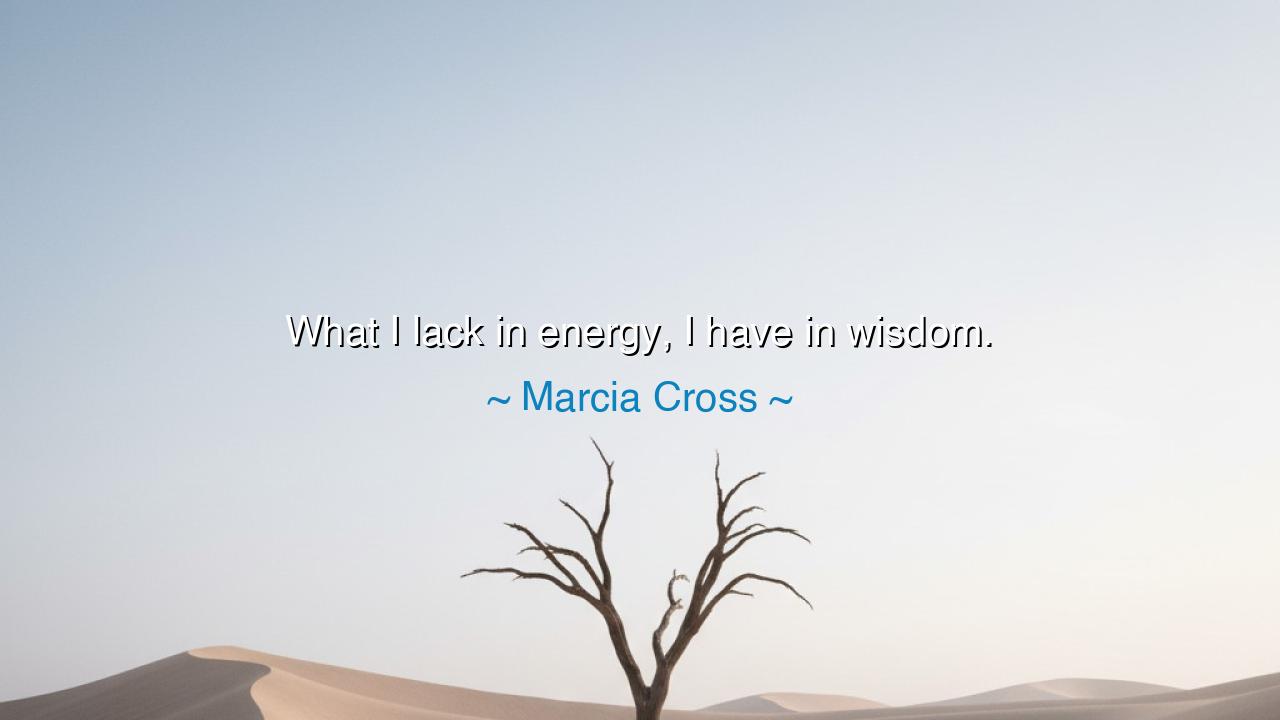
What I lack in energy, I have in wisdom.






Hear me, O children of the future, for I bring to you a wisdom that speaks to the heart of human strength, as Marcia Cross so wisely declared: "What I lack in energy, I have in wisdom." These words resonate with the ancient understanding that true power does not always lie in the vigor of the body, but in the depth of the mind and the clarity of the soul. There are those who, though their strength may fade or their vitality diminish, possess a wealth of wisdom that can guide others with a steady hand. It is a reminder that, even in the absence of physical energy, the spirit can still shine brightly with insight and understanding.
Consider the ancient sages, whose wisdom was not measured by their physical prowess but by the enduring strength of their minds. Confucius, though not a warrior in the traditional sense, wielded a far greater power—the ability to shape the hearts and minds of nations through his teaching. He knew that the energy of the body fades with time, but wisdom grows, deepens, and endures. It is through this inner strength that we can lead, not by force, but through guidance, reflection, and patience. Confucius understood that to teach and lead requires not just physical might but the quiet energy of the mind and heart.
Similarly, consider the life of Socrates, whose energy may have been humble, but whose wisdom left an indelible mark on the world. His philosophical inquiry was not an act of physical labor, but of deep reflection and relentless questioning. Even in his later years, Socrates’ body may have weakened, but his mind remained sharp, capable of turning the minds of his students toward the greater truths of existence. His legacy was not one of physical conquest, but of mental and spiritual victory. Wisdom, like the river that flows beneath the surface, moves steadily and powerfully, even when the body can no longer race like the swift current.
And let us not forget the enduring strength of Nelson Mandela, who, though imprisoned for years, drew upon the wisdom of his heart and mind to lead a nation to freedom. As his body aged, his energy waned, yet his wisdom grew ever more profound, guiding South Africa through its darkest hours. Mandela’s strength was not in his physical energy, but in his ability to inspire others with his profound understanding of justice and peace. Like the mighty oak, whose roots grow deeper with time, his wisdom became the anchor that held his people together, even when his body could no longer stand as tall as it once had.
So, O children, understand this: true strength does not reside in the fleeting power of the body, but in the enduring wisdom of the soul. In times when your energy fades, let your mind grow ever sharper, for it is through wisdom that you will find the strength to face any challenge. Whether you have the strength to move mountains or the wisdom to move hearts, know that both are gifts, and each can guide you to greatness. Let your mind be your guiding star, and your wisdom the light that leads you through the ages.






BMBach Mai
This statement sparks questions about societal assumptions regarding productivity and capability. Are people often judged more by their energy than their discernment? Could cultivating wisdom be a more sustainable approach to life than relying solely on energy, especially in complex or long-term endeavors? I also wonder if this observation applies universally or if it’s shaped by personality, profession, or circumstance, highlighting the multifaceted nature of human effectiveness.
MLTran Huynh Mai Linh
I find this quote both charming and provocative. It implies that insight can counterbalance a lack of vitality, but does wisdom always translate into effective action? Can cleverness and understanding truly compensate for physical limitations, or is energy still necessary for execution? It also makes me ponder whether this perspective reflects self-acceptance and awareness, acknowledging limitations while embracing one’s unique strengths.
QKQuoc Kiet
This statement invites reflection on the balance between action and contemplation. Could someone with less energy but more wisdom make better decisions or avoid unnecessary risks? It also makes me question whether this trade-off is common—do people naturally develop wisdom as energy declines, or is this an individual observation? I’m curious about how such a mindset shapes personal relationships, career choices, or approaches to problem-solving.
KCQua Tao Kim Cuong
Reading this, I’m struck by the notion that wisdom and energy are two different forms of power. Can someone achieve goals more effectively through careful thought and understanding, even if they lack stamina? It raises questions about how society values physical vigor over mental acuity, or vice versa. I also wonder if this perspective might resonate with older adults or those who’ve learned to rely on experience rather than sheer effort.
DNDo Nga
This quote makes me reflect on the trade-offs between physical energy and mental insight. Is it possible that wisdom can compensate for a lack of vitality in decision-making or life achievements? I also wonder if this statement is self-reflective humor or a serious acknowledgment of personal strengths. Could a person’s strategic thinking or life experience truly outweigh the advantages of raw energy in navigating challenges?